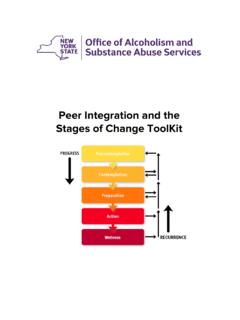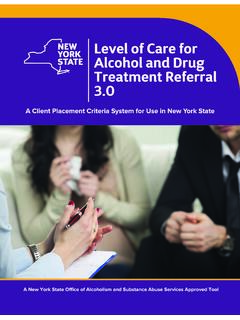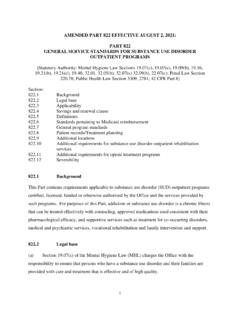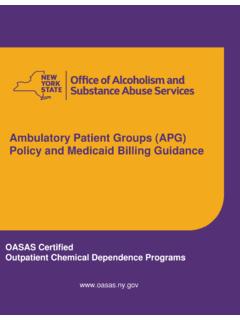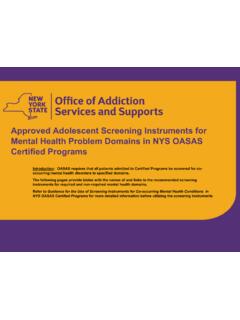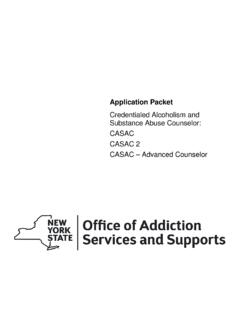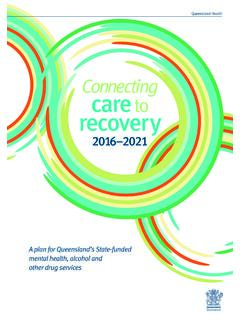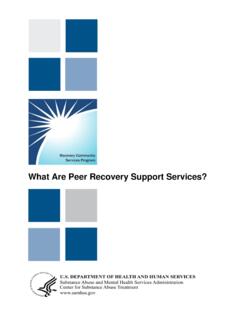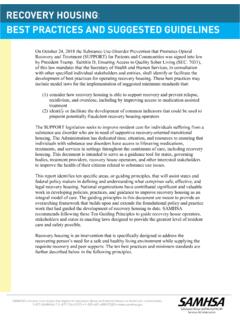Transcription of Peer Advocate Services in OASAS Certified Programs Settings
1 ANDREW M. CUOMO Governor ARLENE GONZ LEZ-S NCHEZ, , Commissioner 501 7th Avenue | New York, New York 10018- 5903 | | 646- 728-4760 1450 Western Avenue | Albany, New York 12203-3526 | | 518- 473-3460 DEC 2019 peer Advocate Services in OASAS Certified Programs Settings Introduction The Office of Addiction Services and Supports ( OASAS ) recognizes Substance Use Disorder (SUD) as a chronic condition best managed by a broad continuum of Services . As with other chronic conditions, where reoccurrence of symptoms is possible, the ability to integrate non-clinical support is essential to comprehensive care planning. OASAS supports efforts to further expand available clinical and non-clinical support Services for individuals and families living with SUD, including the development of a recovery Oriented System of Care (ROSC).
2 ROSC is a coordinated network of community-based Services and supports that is person-centered by building on the strengths and resiliency of individuals, families and communities to engage in treatment Services , recovery supports and strive to improve overall health, wellness, and quality of l ife to those with and at risk of SUD. peer Support Services are an essential part of these transformation efforts. peer Advocate Services OASAS defines a peer Advocat e as an individual who uses their knowledge acquired through lived experience related to substance use, to support the recovery goals of i ndividuals who use drugs and/or alcohol. Peers are natural support experts, meaning that the relationships they establish can lead to increased feelings of support, safety, and wellbeing among the individuals they serve.
3 Through a combination of lived experience and professional training, peers can provide an array of face-to-face peer support Services with a client. peer support Services are defined as Services for the purpose of outreach for engaging an individual to consider entering treatment, reinforcing current patients engagement in treatment and connecting patients to community based recovery supports cons is tent with treatment/ recovery and discharge plans. 1 peer support Services mus t be delivered by a Certified recovery peer Advocate (CRPA) or CRPA-Provisional (CRPA-P). peer support Services target recovery outcomes such as improved health and wellness; an increased sense of self-efficacy or empowerment; and increased success and satisfaction in a range of community Settings such as work, home and school, instead of merely focusing on symptom reduction.
4 1 14 NYCRR Part (AC) 501 7th Avenue | New York, New York 10018- 5903 | | 646- 728-47601450 Western Avenue | Albany, New York 12203-3526 | | 518- 473-3460 DEC 2019 There are several key characteristics of peer support Services , including: Are person-centered and strength-based. They help individuals to identify existingrecovery capital and build future capital. Are relationship-oriented, garnering a sense of trust, confidence, authenticity andefficacy, based on shared experience. Support an individual in defining and directing his or her own treatment/ recovery plan,backed with guidance, structure, support and navigation assistance from a peer and aclinical team Engage individuals in a timely and expeditious manner, at critical points of recoveryvulnerability and throughout various stages of the recovery process.
5 Support re-engaging individuals back into appropriate supports and Services in a timelymanner in the event of a recurrence to substance support Services may include, but are not limited to: Engaging with an individual to consider entering treatment. Engaging a client to attend treatment or other healthcare Services . Engaging an individual in continuing care Services post-discharge. Developing treatment/ recovery plans. Raising awareness of existing social and other support Services . Modeling coping skills. Assisting with applying for benefits. Accompanying clients to court appearances and medical or other appointments. Providing non-clinical crisis support, especially after periods of hospitalization orincarceration. Working with participants to identify strengths. Linking participants to formal recovery supports.
6 Educating program participants about various modes of recovery . Travel training to use public transportation independently. Education and support on the use of medication assisted support Services are person-centered; even though Services emphasize knowledge and wisdom through lived experience, peers are encouraged to be extremely intentional in how they share their story or pull from first-hand knowledge to ensure that they are supporting the program participant s own pathway to recovery . peer support Services are not: A program model; Focused on diagnoses or deficits; Helping in a hierarchical way ( , there is equal power distribution between peer andclient); Treatment compliance; Medication compliance monitoring; Monitoring individual behavior; or Care management. 501 7th Avenue | New York, New York 10018-5903 | | 646- 728-4760 1450 Western Avenue | Albany, New York 12203-3526 | | 518- 473-3460 DEC 2019 Role Delineation in Clinical Settings Peers may work in a variety of Settings .
7 peer Advocate Services are currently reimbursable when delivered by a CRPA or CRPA-P rovisional (P), employed in or contracted by an outpatient program Certified pursuant to 14 NYCRR Part 822, a designated Home and Community Based Services (HCBS) provider, or by Inpatient/Residential Providers within their Per Diem. This resource will focus on the delivery of peer support Services in an outpatient clinical setting. Please see the Resources section at the end of this document for links to materials on peer Services in other Settings . Programs employing and/or contracting for peers that will have regular and substantial unsupervised contact with patients are expected to conduct required criminal background checks. peer Supervision A Qualified Health Practitioner (QHP) that is assigned to supervise peers should demonstrate the twenty requisite competencies for peer recovery values, principles, and core concepts must be embedded in the supervision practice.
8 The eight principles of peer supervision identified from convenings of national experts conducted by the Substance Abuse and Mental Health Services Administration (SAMHSA) in 2016 include: 1. Supervision is an act(ion) not a Supervision is a strength-based process in which there is mutual Supervision enhances and develops the unique knowledge and skills necessary forsuccessful peer Supervision provides a safe space to address ethical dilemmas and boundary Supervision engages peer practitioners in strengthening the peer recovery Support Services (PRSS) Supervision fosters an organizational environment / culture that is conducive to Supervision clarifies organizational systems, structures, and Supervision supports of these principles has corresponding supervision practices and preceding premises based on peer support principles.
9 In order to fully integrate peers into clinical Settings , the clinical team should learn about the role of the peer and clearly understand how it differs from a clinical role. Peers will participate on the multidisciplinary team and may add valuable experience and insight from the perspective of a peer . The peer s role should not reflect that of a junior clinician but as a valuable independent member of the team who offers the unique insight from the point of view of a peer 2 Martin, Jordan, Razavi, Burnham, Linfoot, Knudson, DeVet, Hudson, & Dumas (2017). Substance Use Disorder peer Supervision Competencies, The Regional Facilitation Center, Portland, Oregon. 501 7th Avenue | New York, New York 10018-5903 | | 646- 728-4760 1450 Western Avenue | Albany, New York 12203-3526 | | 518- 473-3460 DEC 2019 with shared experience.
10 Peers may provide a voice for individuals in treatment as advocates for participant driven goals and objectives. They may also provide solutions to improve recovery orientation of the clinic and in developing richer recovery supports for individuals as well as recovery resources for the clinic. However, peers do not replace the individual client in contributing to the treatment planning process. While a peer may be a part of the multidisciplinary team and may participate in meetings of the team; they do not lose their unique position with the client. The clinical team must avoid putting a peer in conflict with the client and avoid conflicts between clinical staff and peers. Understanding the role of the peer can help in decreasing the likelihood that these conflicts will occur. The peer can help provide information to the team as an Advocate for the client.
